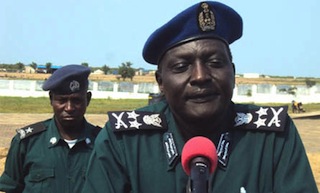Calls for deputy interior minister to resign over detention of Juba journalists
May 12, 2013 (JUBA) – The South Sudan Human Rights Society for Advocacy (SSHURSA) has called for South Sudan’s deputy minister of interior to step down over the detention of two Juba Monitor newspaper journalists who were recently detained by police.

Investigations by SSHURSA found that the journalists were detained under the orders of deputy interior minister Lt. General Salva Mathok Gengdit, who complained of being defamed by the newspaper and Unity’s state’s Bul community.
In a letter signed by their leaders and published in the Juba Monitor, members of the Bul community dismissed denials made by the minister over allegations related to the murder of Banyjioth Mathoat Tap from the Bul community, whose body was found under Mathok’s house on 30 March.
The letter was the second published by the newspaper containing allegations the minister was involved in the young man’s death. Mathok has strongly denied the claims.
SSHURSA says Mathok ordered police to summon the journalists and investigate Juba Monitor’s senior management following the publication of the second letter, claiming his reputation had been tarnished by the newspaper and the Bul community.
SSHURSA says the actions of the police constitute a clear case of intimidation against the press and abuse of power by persons in a position of authority.
“This is a direct abuse of the rights to freedom of expression and media under Article 24 of the transitional constitution of South Sudan 2011. This constitutional provision allows every citizen to express, receive, disseminate or publish information within the limits of the law”, the human rights organisation said in a statement last Friday.
The annual press freedom index published by Reporters Without Borders (RWB) earlier this year puts South Sudan at 124th out of the 180 countries ranked, with the international media watchdog linking the country’s low placing to the general heavy-handedness of government and security services.
SSHURSA said the detention of the journalists clearly violated a number of international and regional conventions signed by South Sudan on the protection of human rights and freedom of expression.
“The detention of the two journalists under unending interrogations in the truest sense of the meaning, amounts to inhuman and degrading treatment”, SSHURSA said in the statement.
“The police personnel, by detaining Michael Koma and Alfred Taban for three days and eight hours and keeping them in such situation of uncertainty respectively in the orders of the deputy minister of interior, have attacked the provisions of the constitution and the laws of South Sudan for which their sole constitutional establishment is meant to respect and protect”, it added.
SSHURSA have reiterated calls for South Sudan’s president, Salva Kiir to step in and suspend Mathok from his ministerial duties with immediate effect, pending a full investigation into the murder.
“SSHURSA calls again upon the office of the prosecutor-general to courageously and independently go on with the investigations of the case, disallowing the ministry of interior to take any part and this shall [thus] remove [any] conflict of interest within the ministry of interior attempting to investigate itself”, the statement said.
SSHURSA is also seeking the withdrawal of defamation charges against the Juba Monitor and the Bul community.
In comments made after the discovery of Tap’s body, Charles Machieng, the ex-commissioner of Unity state’s Mayom county, said the boy had gone to a nearby shop on the 28 March but never returned home. His body was found two days later dumped behind Mathok’s house, with traces of blood also leading to the scene.
The 25-year-old former traffic officer had been well-regarded in the Mayom community, with his murder described as “barbaric” and “an act of tribalism”.
(ST)
